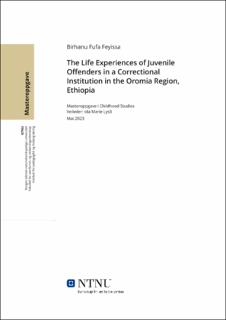| dc.description.abstract | This thesis explores the everyday life experiences of juvenile offenders in a correctional institution in the Jimma District, Oromia Region, Ethiopia. The thesis seeks to answer three research questions: 1) What are the everyday life experiences of juvenile offenders in a correctional institution? 2) How do juvenile offenders navigate and negotiate everyday institutional regulations? and 3) What are the everyday challenges of juvenile offenders in custody, and how do they navigate these challenges? The thesis draws on three months of ethnographic fieldwork conducted with adjudicated juveniles, using the methods of participant observation, individual interviews, and participatory methods such as role-play, drawings, essays, diaries, and ranking and scoring techniques.
Data analysis reveals that incarcerated juveniles at the institution experienced everyday life in prison as an interruption of childhood. I argue that imprisonment interrupted their childhood by preventing them from engaging with families and not adequately addressing their need for educational, social, psychological, health, and vocational skills. Children characterized their everyday lives in prison as boredom, idle, put on hold, and a waste of time due to the lack of adequate activities that can engage and occupy them. The study also reveals that incarcerated children experience multiple forms of abuse from correctional staff and other inmates, including physical, psychological, verbal, exploitation, and neglect. Incarcerated children face multifaceted challenges such as difficult living conditions, poor rehabilitation and treatment services, limited access to education and skills training, limited opportunities to engage with families and the outside community, lack of participation in institutional matters, and limited positive psychosocial environment within the custodial institution of the study site.
This study reveals that despite the negative situations and challenges that prison life presents, incarcerated children stay strong and enact agency to navigate and negotiate their everyday lives within the prison. Juvenile inmates navigate institutional regulations through collective and individual approaches. The collective or shared agency involves collaboration among children in finding a solution to their problems through which they care for and protect each other. The individual approaches of juveniles’ agency to navigate and negotiate institutional regulations include learning the rules, complying, and enacting agency through staff manipulations. Learning the tricks, rules and regulations, and prison culture is the first approach they employ to manoeuvre their everyday lives in prison. Agency through staff manipulation involves juveniles playing the victims’ role, such as trying to win the sympathy of correctional staff to meet their needs.
Findings further uncover how juveniles navigate and cope with everyday life challenges in prison, including solidarity with others, using external support from families, NGOs, and GOs, and using engagements in a variety of activities like labour work, educational and vocational programs, religious activities, playing games, and watching movies. The study reveals the reliance of juvenile inmates on each other and adult inmates, and sometimes on correctional staff to navigate and cope with daily life challenges at the institution. The study suggests the importance of concerted efforts among stakeholders, including children to improve the living circumstances of incarcerated children, and priority for the use of non-custodial alternatives for the management of children in conflict with the law, as well as further research on the pros and cons of placing and treating young people in adult prisons in the context of resource scarce settings like Ethiopia. | |
